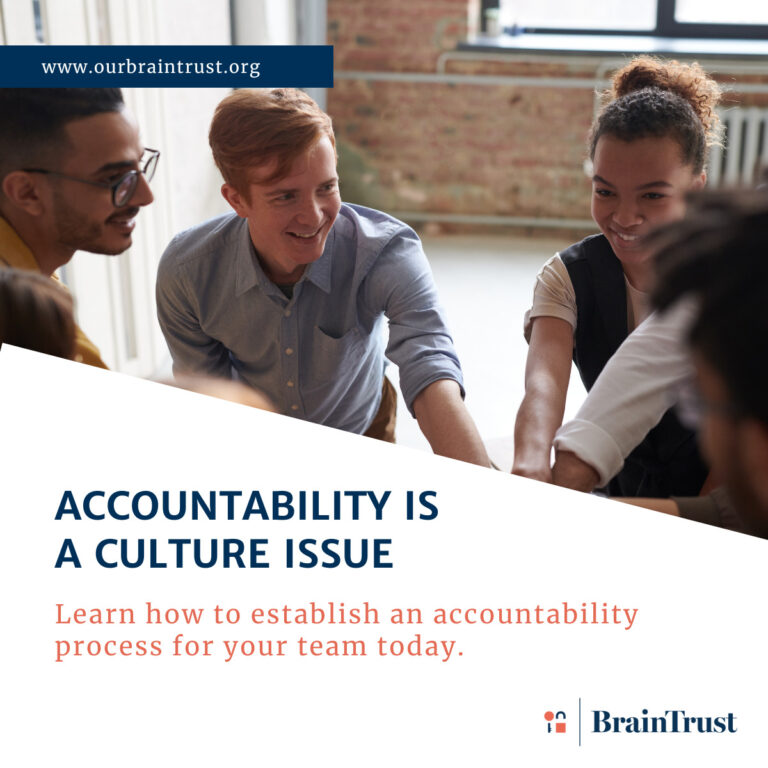The Power of Listening: Why Silence is Key in Leadership and Sales
“I’m tired of how they lean in and LISTEN to me”… said NO ONE EVER. We all long to be heard, to have a voice. To have our needs and opinions matter. With your life partner, co-workers, parents…and children, accountant, and doctor. When the person across from you determines to be silent…and to listen, how powerful!
A few months ago, I had a lunch appointment with a salesperson who purportedly wanted to “learn more about BrainTrust.” If that was their motive, they left empty-handed because they didn’t ask a single question about the business. Instead, they talked incessantly, missing the critical opportunity to truly listen and understand my business challenges. They talked about their education and their pedigree. About how smart they were. And how well-connected. Had I needed their services, they wouldn’t know because they did all the talking.
They didn’t have a clue about my challenges, my motivation, my inspiration, or the current state of my business. But they gave me the chance to learn one thing for sure: I didn’t want to do business with them. Why? They lacked basic empathy and self-awareness – it was all about them and their solution without understanding if I even had a problem that needed to be solved.
To be clear, I was once just like that salesperson (and sadly, guilty even now whenever I’m nervous) who did all the talking. I wanted to establish myself as the person holding the solution to their problem. I had a pitch I had to give! But I DIDN’T GIVE THEM A CHANCE TO TELL ME ABOUT THEIR PROBLEMS. I tried to be engaging when instead, I was a boring salesperson with an agenda all my own. I’m sure I burned a lot of bridges without knowing it. I’ve learned that talking too much can alienate potential clients and hinder relationship-building.
Listening isn’t just for salespeople, it’s for business owners too!
When I first thought about writing this blog, I thought of it in regards to our sales teams – making sure THEY know that listening is their most critical tool. But then it occurred to me that we as the Founder and CEO of our companies are also in sales. Right? We are selling people on the idea of coming to work for us. We’re selling banks and investors on why they should want to work with us. We are selling potential customers on all the features and benefits of our offerings. We’re selling our families on why they should support our entrepreneurial journey. We are always selling! So, I turned the focus of this message to us, on all the ways business owners could benefit if we spent more time listening.
Here are the practical ways in which listening plays a vital role for us leaders…and some open-ended questions that can get the other person to talk, while we listen. The key isn’t to pummel them with questions, interrogating them. Rather, it’s to get them to talk so we can listen. And we listen not just to the answers, the stories, but HOW they’re told – tapping into the emotional and spiritual aspects that might be underlying.
Potential Customer Conversations: Listening to Understand Needs
What is the biggest challenge your company is facing right now? Tell me more about that. What solutions are you considering? How much time do you think it will take to tackle this situation? Listen intently. Take notes on what they say…and the emotions they are showing. Their emotional state will give you so much insight into whether you have a solution that can work for them. Or if they are the type of customer you want. You’ll learn if they have unreasonable expectations when it comes to the cost or time. Sometimes, after asking the questions and just listening, you’ll decide you don’t want them as a customer!
Listening to Employees: Building a Stronger Team
What part of your job do you love the most? Why? Which part of it is the most frustrating? Why? What do you need from me to make it possible for you to spend more time doing the part you love? What can we do together to deal with the frustrating part? When they feel your sincere interest in the work they do on your behalf, they’ll openly share ideas to make the company better and more efficient. Those at the heart of the business, doing the work of the business, are best situated to identify obstacles and come up with winning solutions.
Listening in Personal Relationships: Strengthening Bonds
(Ok – my husband is good at this…) What was the best part of your day? How did that make you feel? What happened with __________? Often, with our life partners, we vent when we’re talking, not seeking advice or opinions. We simply want the listening ear of a person who loves us and wants what’s best for us. And that’s why it’s even harder for them to just listen! My husband and I have this method for dealing with that. If he is telling me about a problem, I can ask first “Are you seeking my input or are you just venting?” And, if either of us offers up unwanted advice, the other simply responds firmly “Thank you”, signaling to the other that we want a listening ear only. THAT IS HARD!
Current Customer Conversations: Listening to Improve and Strengthen Relationships
In what ways does our service meet or exceed your expectations? Where have we disappointed you? How has our solution helped your business? Where are there gaps? Where do you still need help? If you are knocking it out of the park, they will talk your ears off, telling you how great your company is. But if they are disappointed, even a little, YOU WANT TO KNOW! Don’t get defensive. Just listen. And then share what you heard – and ask if you got it right. Give it your thoughtful consideration before you come back with a solution. Let them be confident in your ability to be silent and listen.
Listening to Mentees and Peers: Encouraging Growth Through Understanding and Shared Experiences
How does that make you feel? What is your biggest worry? Your greatest hope? What do you imagine is the ideal solution? Who do you need to meet to make that happen? What is your part in this predicament? In this situation, it’s especially hard to focus on listening because we’re full of answers and solutions. Instead, focus on making sure you see the full picture. Ask questions for clarification, not to lead them to the conclusion YOU see. And when they ask for your input, refrain from giving advice. Instead, share any relevant experiences you have, both positive and negative.
In a world that is so filled with constant noise and chatter – be a place of quiet and calm. Listening, especially in leadership and sales, is not just about hearing words—it’s about understanding, empathizing, and connecting on a deeper level. Give others the gift of listening, allowing them to be seen and heard. Be silent. Listen. And flick me when I start yacking instead of listening. I’m trainable. If you ever need a quick trick to remember these principles, use my favorite anagram ever: L I S T E N = S I L E N T.








